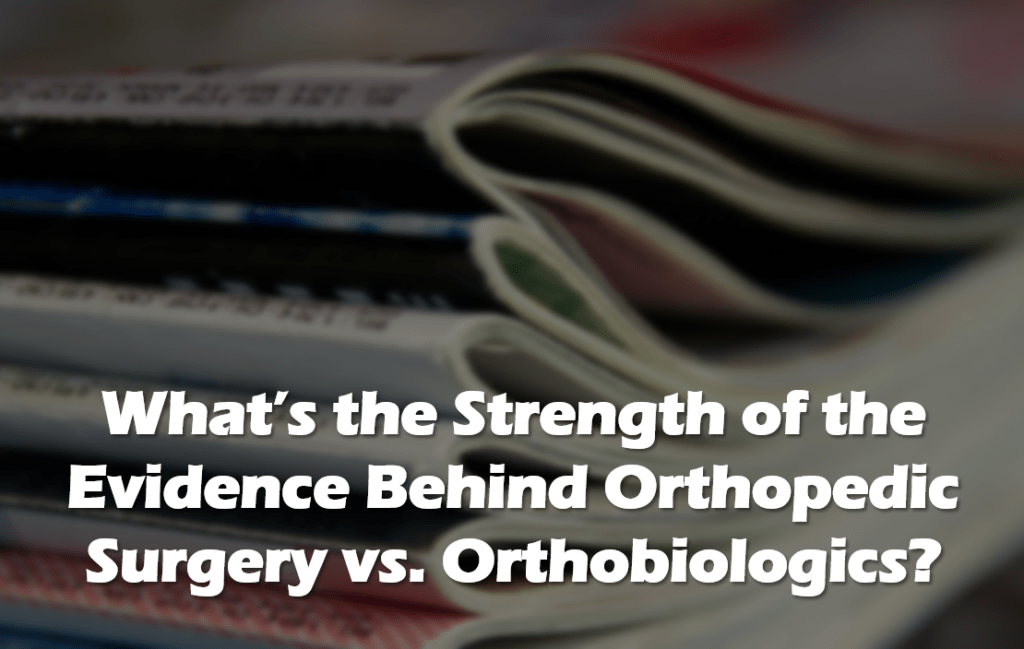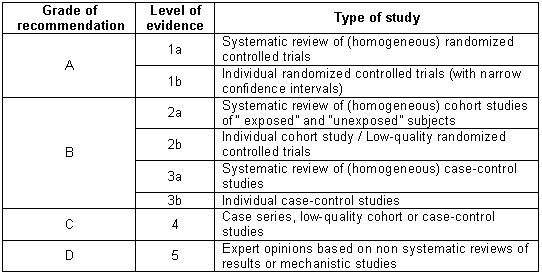How Good Is Orthopedic Surgery Research vs. Orthobiologics?

One of the more interesting realities of orthopedic regenerative medicine is that orthopedic surgeons often call for high-level research before being willing to accept new regen med therapies. The problem? As my mother used to say, that’s the pot calling the kettle black. Meaning that as a new research study shows, orthopedic surgeons have a long way to go before most of their surgeries have that same high-level research backing. Let’s dig in.
Grading Research
Medical research is often graded using a scale from 1-5 as shown below:

Basically, level 1 evidence is the best, which is either a randomized controlled trial (RCT) or a review of a bunch of similar RCTs. Randomized simply means that a patient was given therapy A or B or placebo in a random fashion. Level 2 is reserved for non-randomized studies where treatment A is compared to treatment B (cohort study). Level 3 is a case-control study or one where the records of patients who have had a specific treatment are picked apart to see why some may have responded to the treatment while others did not. In level 4, a case series is just a group of patients followed to determine how they fared with a particular treatment. Finally, the lowest level of research is level 5 which is just someone’s expert opinion.
The Orthopedic Surgery Pushback to Regen Med
There are some forward-thinking orthopedic surgeons who have embraced regen med. These surgeons aren’t threatened by the idea that platelet-rich plasma (PRP) or bone marrow concentrate (BMC) procedures may replace some of their surgeries. If anything, the newness and novelty of it all gets them excited for the future.
However, there are also some orthopedic surgeons on the other side of that coin. They are very threatened by regen med, so one of their first knee-jerk reactions is to claim that level 1 evidence needs to exist before any of them would consider using regen med or before any other physicians should be using these new technologies. The problem? What they already do every day by offering traditional orthopedic surgery has no such research backing. In fact, orthopedic surgery is one of the most poorly researched disciplines out there. Now a new study, performed by orthopedic surgeons who practice and embrace regen med puts their colleagues in their proverbial places. Let’s dig in.
The New Research
A big thanks to Don Buford, M.D. from Dallas who pulled this new research together. The new study monitored 6 major orthopedic journals for a year and reviewed 1425 published papers (1). What was the average level of evidence for these new studies on traditional orthopedic surgery? A 3 out of 5! Think about that for a minute. Getting a new drug approved so that it can be used by an internist requires level 1 evidence. A new surgery? Apparently level 3 or less.
As stated above, orthopedic surgeons often claim that before regen med can be used, there should be level 1 evidence. However, the average research quality on what orthopedic surgeons do every day as published in their own top journals is a paltry level 3. That’s the new stuff!
Comparing the Quality of Orthopedic Surgery Research to Orthobiologics
So let’s take the two most commonly used orthobiologics on earth for their most common indications, PRP and BMC used to treat knee arthritis, and compare their research support to the research support for common knee surgeries. This is where my mother’s saying about pots will come in handy. Let’s dive in.
Platelet-rich plasma has more than 2 dozen level 1 studies showing it’s effective in the treatment of knee arthritis (5-21). BMC has three level 1 studies showing it’s effective (2-4). How many can I find showing that knee replacement is effective for treating knee arthritis? One single RCT comparing knee replacement to physical therapy (22). If we compare these two orthobiologics to other very common procedures like partial meniscectomy (the most common elective orthopedic surgery performed in the US), it gets even worse. Here we have three level-1 studies showing that the surgery is INEFFECTIVE (23-25).
The upshot? Common regen med treatments used in common orthopedic problems have better research evidence than orthopedic surgery. In addition, the new research being published by orthopedic surgeons is usually of low quality. Hence, as my mother used to say, any orthopedic surgeon who requires more evidence for regen med than his or her specialty is willing to produce is truly “the pot calling the kettle black”.
________________________________________
References:
(1) Tulpule S, Buford D, et al. The Average Level of Evidence of Papers Published in Six major Orthopedic Journals. Biologic Orthopedic Journal. Vol (2)1:e1-e6. https://www.dropbox.com/s/m4ui4b25v0nk4hd/Avg%20level%20of%20Evidence%20paper%2012%3A7%3A20.pdf?dl=0
(2) Centeno C, Sheinkop M, Dodson E, Stemper I, Williams C, Hyzy M, Ichim T, Freeman M. A specific protocol of autologous bone marrow concentrate and platelet products versus exercise therapy for symptomatic knee osteoarthritis: a randomized controlled trial with 2 year follow-up. J Transl Med. 2018 Dec 13;16(1):355. doi: 10.1186/s12967-018-1736-8. PMID: 30545387; PMCID: PMC6293635.
(3) Hernigou P, Bouthors C, Bastard C, Flouzat Lachaniette CH, Rouard H, Dubory A. Subchondral bone or intra-articular injection of bone marrow concentrate mesenchymal stem cells in bilateral knee osteoarthritis: what better postpone knee arthroplasty at fifteen years? A randomized study. Int Orthop. 2020 Jul 2. doi: 10.1007/s00264-020-04687-7. Epub ahead of print. PMID: 32617651.
(4) Hernigou P, Delambre J, Quiennec S, Poignard A. Human bone marrow mesenchymal stem cell injection in subchondral lesions of knee osteoarthritis: a prospective randomized study versus contralateral arthroplasty at a mean fifteen year follow-up. Int Orthop. 2020 Apr 23. doi: 10.1007/s00264-020-04571-4. Epub ahead of print. PMID: 32322943.
(5) Uslu Güvendi E, Aşkin A, Güvendi G, Koçyiğit H. Comparison of Efficiency Between Corticosteroid and Platelet Rich Plasma Injection Therapies in Patients With Knee Osteoarthritis. Arch Rheumatol. 2017;33(3):273–281. Published 2017 Nov 2. doi: 10.5606/ArchRheumatol.2018.6608
(6) Tavassoli M, Janmohammadi N, Hosseini A, Khafri S, Esmaeilnejad-Ganji SM. Single- and double-dose of platelet-rich plasma versus hyaluronic acid for treatment of knee osteoarthritis: A randomized controlled trial. World J Orthop. 2019;10(9):310–326. Published 2019 Sep 18. doi: 10.5312/wjo.v10.i9.310
(7) Joshi Jubert N, Rodríguez L, Reverté-Vinaixa MM, Navarro A. Platelet-Rich Plasma Injections for Advanced Knee Osteoarthritis: A Prospective, Randomized, Double-Blinded Clinical Trial. Orthop J Sports Med. 2017;5(2):2325967116689386. Published 2017 Feb 13. doi: 10.1177/2325967116689386
(8) Raeissadat SA, Rayegani SM, Hassanabadi H, et al. Knee Osteoarthritis Injection Choices: Platelet- Rich Plasma (PRP) Versus Hyaluronic Acid (A one-year randomized clinical trial). Clin Med Insights Arthritis Musculoskelet Disord. 2015;8:1–8. Published 2015 Jan 7. doi: 10.4137/CMAMD.S17894
(9) Görmeli G, Görmeli CA, Ataoglu B, Çolak C, Aslantürk O, Ertem K. Multiple PRP injections are more effective than single injections and hyaluronic acid in knees with early osteoarthritis: a randomized, double-blind, placebo-controlled trial. Knee Surg Sports Traumatol Arthrosc. 2017 Mar;25(3):958-965. doi: 10.1007/s00167-015-3705-6.
(10) Montañez-Heredia E, Irízar S, Huertas PJ, et al. Intra-Articular Injections of Platelet-Rich Plasma versus Hyaluronic Acid in the Treatment of Osteoarthritic Knee Pain: A Randomized Clinical Trial in the Context of the Spanish National Health Care System. Int J Mol Sci. 2016;17(7):1064. Published 2016 Jul 2. doi: 10.3390/ijms17071064
(11) Lana JF, Weglein A, Sampson SE, et al. Randomized controlled trial comparing hyaluronic acid, platelet-rich plasma and the combination of both in the treatment of mild and moderate osteoarthritis of the knee. J Stem Cells Regen Med. 2016;12(2):69–78. https://www.ncbi.nlm.nih.gov/pmc/articles/PMC5227106/
(12) Tavassoli M, Janmohammadi N, Hosseini A, Khafri S, Esmaeilnejad-Ganji SM. Single- and double-dose of platelet-rich plasma versus hyaluronic acid for treatment of knee osteoarthritis: A randomized controlled trial. World J Orthop. 2019;10(9):310–326. Published 2019 Sep 18. doi: 10.5312/wjo.v10.i9.310
(13) Lin KY, Yang CC, Hsu CJ, Yeh ML, Renn JH. Intra-articular Injection of Platelet-Rich Plasma Is Superior to Hyaluronic Acid or Saline Solution in the Treatment of Mild to Moderate Knee Osteoarthritis: A Randomized, Double-Blind, Triple-Parallel, Placebo-Controlled Clinical Trial. Arthroscopy. 2019 Jan;35(1):106-117. doi: 10.1016/j.arthro.2018.06.035.
(14) Huang Y, Liu X, Xu X, Liu J. Intra-articular injections of platelet-rich plasma, hyaluronic acid or corticosteroids for knee osteoarthritis : A prospective randomized controlled study. Orthopade. 2019 Mar;48(3):239-247. doi: 10.1007/s00132-018-03659-5.
(15) Yu W, Xu P, Huang G, Liu L. Clinical therapy of hyaluronic acid combined with platelet-rich plasma for the treatment of knee osteoarthritis. Exp Ther Med. 2018;16(3):2119–2125. doi: 10.3892/etm.2018.6412
(16) Di Martino A, Di Matteo B, Papio T, Tentoni F, Selleri F, Cenacchi A, Kon E, Filardo G. Platelet-Rich Plasma Versus Hyaluronic Acid Injections for the Treatment of Knee Osteoarthritis: Results at 5 Years of a Double-Blind, Randomized Controlled Trial. Am J Sports Med. 2019 Feb;47(2):347-354. doi: 10.1177/0363546518814532.
(17) Buendía-López D, Medina-Quirós M, Fernández-Villacañas Marín MÁ. Clinical and radiographic comparison of a single LP-PRP injection, a single hyaluronic acid injection and daily NSAID administration with a 52-week follow-up: a randomized controlled trial. J Orthop Traumatol. 2018;19(1):3. Published 2018 Aug 20. doi: 10.1186/s10195-018-0501-3
(18) Su K, Bai Y, Wang J, Zhang H, Liu H, Ma S. Comparison of hyaluronic acid and PRP intra-articular injection with combined intra-articular and intraosseous PRP injections to treat patients with knee osteoarthritis. Clin Rheumatol. 2018 May;37(5):1341-1350. doi: 10.1007/s10067-018-3985-6.
(19) Louis ML, Magalon J, Jouve E, Bornet CE, Mattei JC, Chagnaud C, Rochwerger A, Veran J3, Sabatier F. Growth Factors Levels Determine Efficacy of Platelets Rich Plasma Injection in Knee Osteoarthritis: A Randomized Double Blind Noninferiority Trial Compared With Viscosupplementation. Arthroscopy. 2018 May;34(5):1530-1540.e2. doi: 10.1016/j.arthro.2017.11.035.
(20) Lisi C, Perotti C, Scudeller L, Sammarchi L, Dametti F, Musella V, Di Natali G. Treatment of knee osteoarthritis: platelet-derived growth factors vs. hyaluronic acid. A randomized controlled trial. Clin Rehabil. 2018 Mar;32(3):330-339. doi: 10.1177/0269215517724193
(21) Cole BJ, Karas V, Hussey K, Pilz K, Fortier LA. Hyaluronic Acid Versus Platelet-Rich Plasma: A Prospective, Double-Blind Randomized Controlled Trial Comparing Clinical Outcomes and Effects on Intra-articular Biology for the Treatment of Knee Osteoarthritis. Am J Sports Med. 2017 Feb;45(2):339-346. doi: 10.1177/0363546516665809.
(22) Skou S, Roos E, Laursen M, Rathleff M, Arendt-Nielsen L, Simonsen O, Rasmussen S. A Randomized, Controlled Trial of Total Knee Replacement. N Engl J Med 2015; 373:1597-1606. DOI: 10.1056/NEJMoa1505467

NOTE: This blog post provides general information to help the reader better understand regenerative medicine, musculoskeletal health, and related subjects. All content provided in this blog, website, or any linked materials, including text, graphics, images, patient profiles, outcomes, and information, are not intended and should not be considered or used as a substitute for medical advice, diagnosis, or treatment. Please always consult with a professional and certified healthcare provider to discuss if a treatment is right for you.
